Mauritius: Leaving a Boat for the Cyclone Season
Spanish circumnavigators Olivia and Carlos of SY Prati share their experience after deciding to leave their boat in Mauritius for cyclone season.
Published 3 years ago
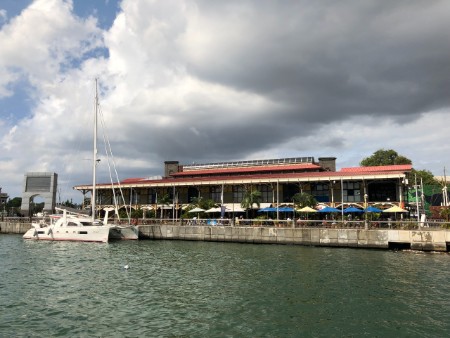

Somos un matrimonio de navegantes dando la vuelta al mundo, desde 2009, en nuestro catamarán PRATI, sin prisas y disfrutando de todo lo que hemos podido hasta la fecha, sobre todo como españoles, de una larga estadía en América del Sur.
After South America – an area so close to our own culture – we have enjoyed French Polynesia, Samoa, Tonga, New Zealand, New Caledonia, the eastern and northern parts of Australia, Indonesia, Cocos Keeling and finally Mauritius, where we arrived in November 2019.
Tras esa zona tan cercana a nuestra cultura, hemos disfrutado de la Polinesia francesa, Samoa, Tonga, New Zealand, Nueva Caledonia, parte E y N de Australia, Indonesia, Cocos Keeling y en ese periplo arribamos en Noviembre de 2019 a Mauritius.
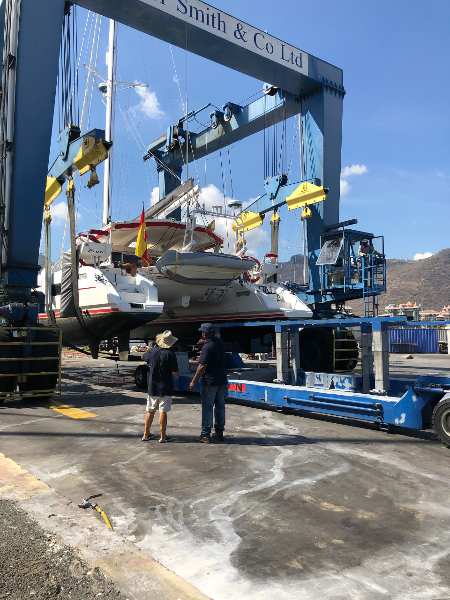 Deciding to Leave our Catamaran in Mauritius
Deciding to Leave our Catamaran in Mauritius
Our first idea was to make a stop in Mauritius and then continue on towards Reunion Island to leave the catamaran there during the cyclone season. However, we did not get a quick response to our enquiries in Reunion to reserve a place at the boatyard, so instead the idea of leaving the catamaran in Mauritius arose.
La primera idea fue hacer una parada y seguir hacia la Isla de Reunión para dejar allí el catamarán durante la estación de ciclones. No encontramos rápida respuesta en Reunión para reservar plaza en varadero y surgió la idea de dejar el catamarán en Mauricio.
We headed to the only boatyard with the capacity to take out catamarans, belonging to a serious-looking company, and we asked about the possibility of leaving the catamaran hauled out there during the cyclone season. They said no problem, they had all the necessary means and as for the official side of things, they would issue a letter saying that they have our yacht in custody and that would suffice. The letter had to be presented at Customs the day before leaving Mauritius to fly to Spain.
Nos dirigimos a un varadero, el único con capacidad para sacar catamaranes, perteneciente a una empresa con aspecto serio y preguntamos por la posibilidad de dejar allí el catamarán en seco durante la estación de ciclones. La respuesta fue que no había problema. Contaban con todos los medios necesarios y en cuanto al tema oficial bastaría con una carta que ellos emiten diciendo que tienen en custodia nuestro barco. Esa carta había que presentarla en la Aduana el día antes de dejar Mauricio para volar a España.
Bank Guarantees, Customs Issues and COVID Delays
We arrived at Customs and were informed that this was only applicable to stays of less than three months. In our case, with our boat scheduled to stay for the cyclone season (a minimum of six months), it was necessary to present a cheque or bank guarantee to cover duties and taxes for the boat of approximately €90,000 (a calculation made by them in Mauritian rupees). The check/guarantee had to be made from a local bank in Mauritius, where of course no foreigner has an account!
Llegamos a la Aduana y nos dijeron que eso era solo aplicable a estadías inferiores a 3 meses. En nuestro caso, previsto para la estación de ciclones, (mínimo seis meses) había que presentar un aval o garantía económica por importe aproximado de 90.000 €, con un cálculo hecho por ellos en rupias de Mauricio. Ese aval, cheque o cualquier otro medio de pago, tenía que hacerse desde un banco local de Mauricio, donde por supuesto nadie que no sea de allí tiene cuenta.
From that moment on and with the Pandemic that prolonged the boat’s stay in Mauritius, we have had a real ordeal trying to satisfy the requirements of the Mauritius authorities with a Guarantee that our bank in Spain provided via an English bank, from London, which has branch in Port Louis, the capital of Mauritius. This has cost us a whole year of paperwork, with the uncertainty of the corresponding threats of a serious penalty, endless problems, disappointments and of course money.
A partir de ese momento y con el COVID de por medio que prolongó la estadía, hemos tenido un autentico calvario para satisfacer los requisitos de las autoridades de Mauricio con un Aval que nuestro banco en España intermedió con un banco inglés, de Londres, que tiene sucursal en Port Louis, capital de Mauricio. Esto nos ha costado todo un año de trámites, con la incertidumbre de las correspondientes amenazas de un serio penalti, un sinfín de problemas, disgustos y por supuesto dinero.
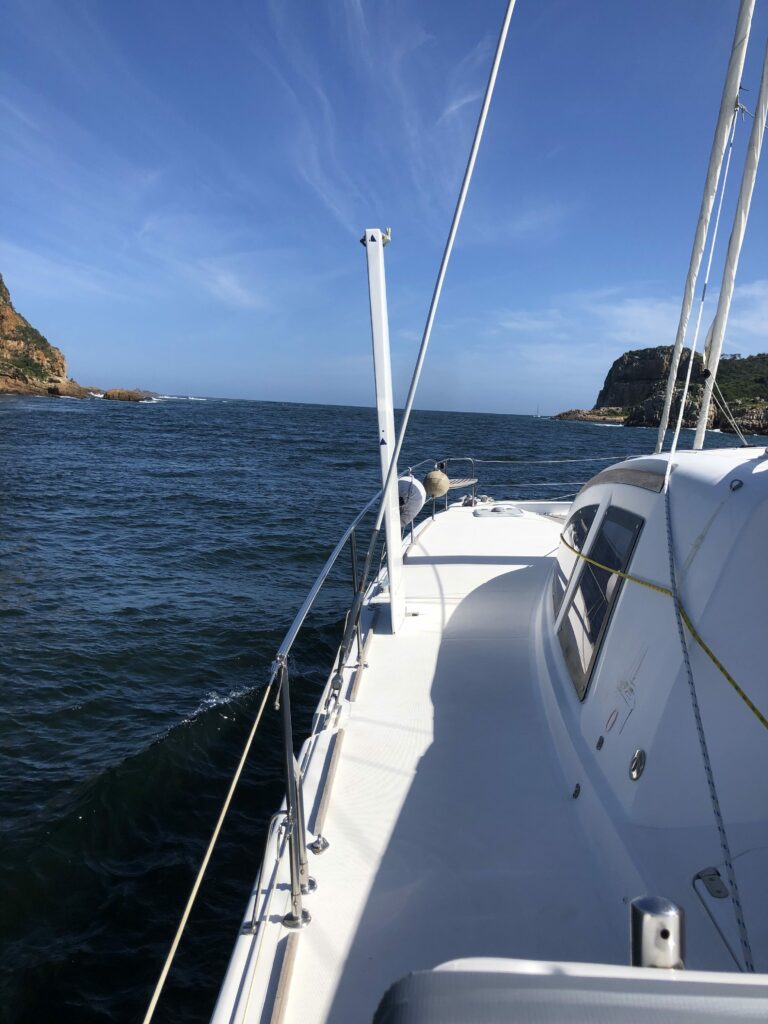

Mauritius kept their borders closed until October 2020. At that time, with all the necessary requirements (negative PCR, vaccination certificate, international medical insurance that covers COVID, double antigen test on arrival and on day five, etc.) we managed to get our boat out of that country with a legislation that is not at all welcoming to foreign sailboats.
Han mantenido sus fronteras cerradas hasta el pasado 1 de octubre. En ese momento, con todos los requisitos necesarios, PCR negativa, certificado de vacunación, Seguro médico internacional que cubra el COVID, doble prueba de antígenos a la llegada a Mauricio y cinco días después, etc. etc. es decir, todo facilidades, hemos conseguido librar a nuestro barco de ese país con una legislación nada acogedora con los veleros extranjeros.
Nowhere in the world have we experienced anything similar (i.e. if the ship is on the hard, the boatyard are responsible for it and there is nothing that can happen that is of concern to Customs).
Les hicimos constar que en ningún lugar del mundo y ya llevamos muchos en nuestro recorrido, habíamos vivido nada semejante y que si el barco está en seco en un varadero y el varadero se responsabiliza de él, no hay nada que pueda ocurrir que sea de incumbencia de Aduanas. Pero no ha valido de nada.
To complete the story, two months after we set sail from Mauritius and after a lot of new procedures, we finally were able to recover our guarantee.
Para completar la historia, han tenido que pasar dos meses desde que zarpamos de Mauricio y un montón de nuevas tramitaciones, para poder recuperar nuestro AVAL.
Not a Good Experience
It is clear that the shipyard did not fully understand the rules, nor are they accustomed to receiving foreign sailboats, nor do they care much. In our opinion it is the worst stay we have had in any country around the world and our boat has been there almost abandoned for two years.
Está claro que el varadero no conocía la realidad de la legislación de su país, ni están acostumbrados a recibir veleros extranjeros, ni les importa mucho.
En nuestra opinión es la peor estadía que hemos hecho en toda la vuelta al mundo y el barco ha estado allí casi abandonado durante 2 años.
To complete the information about Mauritius, we will add that there are no spare parts at all, only the possibility of antifouling. When spare parts are needed, which is common in sailboats, you always have to wait for imports from South Africa, with the associated cost and delay.
Para completar la información acerca de Isla Mauricio, añadiremos que no hay repuestos de nada, solamente posibilidad de antifouling y cuando se precisan repuestos, cosa habitual en los veleros, siempre hay que esperar a la importación desde Sudáfrica, con el consiguiente coste y demora.
Saludos cordiales de la tripulación del PRATI
Olivia y Carlos Magdalena
………………………………………………………………………………………………………………………………………….
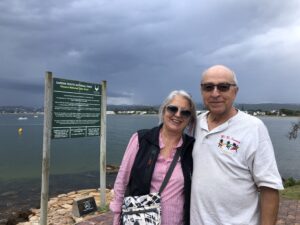

SY Prati’s website – www.prati.es – has a “log” section covering their experiences around the world. Olivia and Carlos have visited many lesser-visited areas, including Cape Horn, the Beagle Channel and the Chilean Channels.
Useful Links:
………………………………………………………………………………………………………………………………………….
The opinions expressed in this article are the author’s own and do not reflect the view of Noonsite.com or World Cruising Club.
Related to following destinations: Mauritius



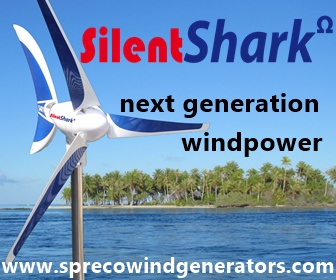


Thx for the update on Mauritius. We are really surprised… Frank & Sigrun SY OM